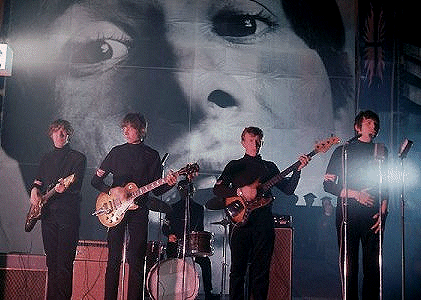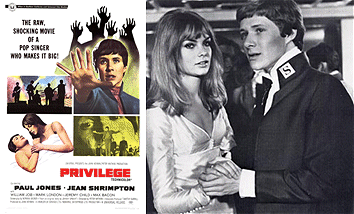Sixties
City presents
a wide-ranging series of
articles on all aspects of the Sixties, penned by the creator of the iconic
60s music paper Mersey
Beat
|
Sixties
City presents
a wide-ranging series of
articles on all aspects of the Sixties, penned by the creator of the iconic
60s music paper Mersey
Beat
|
|||||
|
 |
Starring
Paul Jones, Jean Shrimpton (she never made another film), Mark London,
William Job, Max Bacon, Jeremy Child, The George Bean Group.
Producer John Heyman commissioned television writer Johnny Speight to
pen a screenplay for him which was intended to be a satire that would
“expose the rotten world of pop". He then hired American author
Norman Bognor to rewrite the entire script, transforming it.
When he approached Peter Watkins to direct, Watkins also took part in re-writing the screenplay with Bognor. Discussing the making of the movie, Watkins was to say, “In 1966, following the collapse of a film which I had hoped to develop with Albert Finney’s production company, on the 1916 Easter uprising in Dublin, I was approached by John Heyman, a British artists’ agent, to make a film based on an original screenplay by Johnny Speight, which dealt with the influence of Steven Shorter, a pop star in the 1960s. Watkins had directed the acclaimed television drama ‘Culloden’ and also the television depiction of a nuclear attack on Britain called ‘The War Game’, which the BBC had banned. This was to be his first feature film. He comments, “American novelist Norman Bognor and I adapted the script, which we re-titled ‘Privilege’, to emphasise the significance of Steven Shorter as an allegory for the manner in which national states, working via religion, the mass media, sports, popular culture, etc., divert a potential political challenge by young people. In case this theme appears exaggerated, it is important to keep in mind that it was set in the ‘swinging Britain’ of the 1960s, and was prescient of the way that popular culture and the media in the US commercialised the anti-war and counter-culture movement in that country as well. Set in a totalitarian Britain in a fictitious 1970, the film has been described as social fiction rather than science fiction and concerns the manipulation of the young masses by the Establishment via the use of a popular singer as a figurehead to promote religion and Government policy. |
| Filmed
in Birmingham and London, it features Steven Shorter (Paul Jones) as a
singer who has teenagers screaming with ecstasy at the stage act which
features him in a cage surrounded by youths dressed as policemen who pretend
to beat him while he pleads with the audience to ‘Set Me Free'. Incidentally,
Patti Smith was so impressed by the film that she recorded her own version
of ‘Set Me Free’ on her 1978 album ‘Easter’.
The Government decide that they can use the singer to control the country’s rebellious youth. An artist, Vanessa Ritchie (Jean Shrimpton) is commissioned to paint his portrait and the two become lovers. The Establishment build him into an icon promoting religion and stage him at a massive outdoor festival where, under the influence of Vanessa, he finally decides to rebel, which proves to be his downfall and he is murdered by his adoring fans. ‘Privilege’ was refused a showing on the J. Arthur Rank national cinema circuit in Britain, being described as an “immoral and un-Christian picture which mocks the Church, defies authority and encourages youth in lewd practices". Universal Pictures even withdrew the film after a handful of screenings in a few countries and it has been rarely seen since. In fact, Universal even refused to let the director rent or buy a copy of the film. Privilege was also censored by the BBC. Although it had a very limited release, it aroused great controversy and numerous reviews, with the British critics mainly lambasting it while American critics were more positive. Originally, Sarah Miles had been offered the role of Vanessa and Eric Burdon claimed he had originally been cast as Steven Shorter. The film soundtrack was released on 1st January 1967. There was also an EP featuring the songs ‘Privilege’, ‘Take Me’, ‘(My Poor Heart Is Surely) Breaking’ and ‘I’ve Been A Bad, Bad Boy', the latter track becoming a Top 5 hit in Britain. In the U.S. Capitol T2795 issued ‘Paul Jones Sings Songs From The Film ‘Privilege’ And Others,’ an 11 track album which featured all the numbers from the movie. |

|
|
Article
Text
UK
web hosting by
|